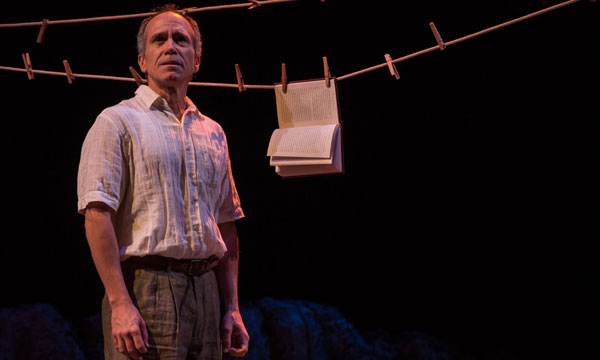2666

(© Liz Lauren)
Clocking in at a staggering five and a half hours, the Goodman Theatre's world premiere of 2666 has been among the most buzzed about world premieres this year. As codirectors and adapters, Seth Bockley and Robert Falls have taken Robert Bolaño's sprawling novel and wrestled it into play form. You can see this staggeringly ambitious project as almost quixotic – the work of two artists who believe in undertaking the seemingly impossible. In our era of three-minute YouTube videos and 140-character tweets, a nearly six-hour drama, with a cast of 15, seems spiritually akin to Don Quixote, and it's fitting that the errant knight's adventures keep coming up throughout the story.
2666 is broken into four chunks, following the structure of the novel. "The Part about the Critics," opens deep in the world of academia. Four scholars (Sean Fortunato, Lawrence Grimm, Nicole Weisner, and Demetrius Troy) are passionately pursuing a mysterious German novelist named Benno von Archimboldi. His background is virtually unknown, as are his whereabouts. Obsessed with finding him, the scholars follow a maddeningly faint trail across Europe and ultimately into a dark, foreboding border town in northern Mexico. Their search is peppered with violence and sex, which culminates horrifically in Santa Teresa Mexico, where hundreds of mostly young and poor women have been raped, mutilated, and murdered by an unknown serial killer.
"The Part about Amalfitano" follows the Santa Teresa professor (Henry Godinez) who hosts the Archimboldi scholars. Dr. Amalfitano has a tenuous grasp on sanity, and lives in terror that his teenage daughter Rosa (Alejandra Escalante) will turn up dead in a ditch. Meanwhile, "The Part about Fate" centers on Rosa and Oscar Fate (Eric Lynch), a journalist from Harlem who is covering a boxing match in Santa Teresa. After the match, Oscar follows Rosa and her friends into a house where BDSM porn (and possibly snuff films) flicker across the walls while monstrous-looking people wearing little else but masks and underwear lurk in the shadows.
"The Part about the Crimes" is a relentlessly graphic exploration of the Santa Teresa murders: There's a naked, dead woman prone upstage for the entire act as a group of corrupt, misogynistic detectives rattle off facts and descriptions about the murders. Finally, there's "The Part about Archimboldi," which traces the history of the elusive writer (played by Mark L. Montegomery) from his childhood in Germany through his arrival in Santa Teresa in the early 1990s.
2666 is threaded through with gorgeous, haunting, and thought-provoking dialogue and imagery. But Bockley and Falls' adaptation is at once too much and not enough. There are endless subplots, themes, and metaphors to unpack over the course of the dramatization, but unlike the nearly 900-page novel, most of them feel rushed or only glancing. Amid the dozens of characters, there isn't one who sticks around long enough to acquire true depth. And in the multi-tentacled, labyrinthine plot, there's no single storyline that emerges as truly captivating or gratifying. Take, for example, the house of porn and masks in Santa Teresa. It's a fascinating set up, but ultimately, we never plunge deep to discover that storyline. It merely serves as shock value, with no meaningful ties to the overall story. "The Part about the Crimes" is particularly weak, it's primary focus is a recitation of gruesome details punctuated by tangential subplots (like an affair between a detective and the head of an insane asylum) that are dead-end b-plots. The only payoff comes in the final 20 minutes of the production, when dozens of loose plot ends are more or less tied together, offering too little, too late.
Bockley and Falls have incorporated a great deal of video into their adaptations , with entire scenes playing as mini-movies in Shawn Sagady's projections. . But while the integration of video is seamless, it's also distracting. The film doesn't add to the production so much as it makes you wonder why you're suddenly watching a movie instead of live actors.
The staging is fairly simple and straightforward, as are Walt Spangler's sets. A long table and a chandelier stand in for Dracula's castle during a scene in Romania; four plastic chairs and a dais make up the world of academia; the Mexican police station is a few desks surrounded by piles of desert sand; Archimboldi's Prussian youth is a matter of forests and marching armies.
In the end, 2666 leaves you with a sense of quantity over quality. Bolaño's towering novel is a meditation on humanity's darkest underside, existing in a world where a sense of dread poisons the air, where violence is everywhere, and God is – quite possibly — nowhere. Onstage 2666 is mostly an endurance test. The ambition is laudable, but for all of the noise on the way to the finish line, the results are disappointing.











